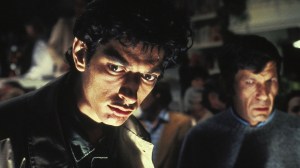A film’s release being delayed doesn’t often bode well for its quality, though there are a number of examples of such delays being the result of studio bureaucracy as opposed to its actual merits. The Woman in the Window, for example, was originally set to hit theaters in October 2019, yet reports of producer-mandated reshoots, as well as production studio 20th Century Fox being acquired by The Walt Disney Company, caused a number of complications with its release. The COVID-19 pandemic only caused more delays with the film’s release, and its upcoming Netflix debut is an instance of a release strategy that is, in fact, as underwhelming as the film itself.
Videos by ComicBook.com
After experiencing some sort of nondescript trauma, Anna (Amy Adams) suffers with agoraphobia, keeping herself holed up in her brownstone as she takes multiple different medications and has a psychiatrist come to her home in hopes of coping with her unresolved issues. She does, however, manage to live vicariously through observing the goings-on in her neighborhood, yet when she believes she has seen a woman violently attacked by her new neighbor, she’s forced to try to prove such a crime occurred from within the confines of her own home.
The premise of The Woman in the Window will surely earn it comparisons to Alfred Hitchcock’s Rear Window, much like how every shark movie since 1975 is compared to Jaws. The reason these comparisons occur is that the Alfred Hitchcock and Steven Spielberg experiences are such astonishing films, it’s hard to believe anyone would even attempt to replicate a similar concept, knowing it would be at least somewhat handicapped by how it lives up to the classics that came before it. This isn’t to say that any new movie can’t also feature a character who is contained to one domicile having to uncover the truth of an event they believed to have occurred, yet it’s the ways in which such a film attempts to circumvent expectations that bring out the film’s potential.
Unfortunately, there’s little in the way of reinvention with this thriller, only offering slight deviations from an expected path to keep us somewhat invested. Anna proves that she is tech-savvy enough to find out the price a new home is sold for in her neighborhood, though this only hints at how technology and the internet could fully reimagine the familiar concept, as we only see brief glimpses of how she can use modern-day techniques to her advantage when she’s otherwise limited to staying in one location. Despite the inherent narrative restrictions of the film, director Joe Wright does manage to evoke a handful of cheap thrills, making the most of his camerawork as he almost entirely keeps the action within four walls. From flashbacks to hallucinations, Wright injects unconventional sequences that blur the lines between fact and fiction, at least visually allowing us to take this formula in new directions.
Outside of the film’s visual language, the tone of the performances is all over the map, with none of the actors seemingly being able to agree on what kind of movie they were starring in. Adams manages to convey the mania of not only her shock and fright at the discovery of a crime committed by her neighbor, impacted by the effects of various medications, yet the supporting cast appears to all want to one-up each other with their extreme personalities. Making this all the more shocking is the fact that the cast is packed with powerful performers. Julianne Moore’s aloofness teeters on insanity, Wyatt Russell’s irritability and judgment come across as emotionally abusive, and Gary Oldman has to constantly find new reasons to be increasingly frustrated by his neighbor’s accusations.
Stripped down to just its story, which is based on the 2018 novel of the same name by A. J. Finn, audiences are given a number of twists and turns to keep you flipping the page. In this regard, there’s superficial entertainment to be gleaned from merely wanting to know what is going to happen next, but the self-serious tone of the whole effort is juxtaposed by the exaggerated performances. It’s hard to like any character or really invest in what happens to them, despite how desperately the film wants you to. From this perspective, the film serves as the cinematic equivalent of a page-turner, yet it likely would have been better received had it debuted as a Lifetime Original, which also would have excused its less nuanced performances.
The Woman in the Window is mostly an inoffensive way to spend 100 minutes, but even compared to other disposable Netflix films like Bird Box or The Perfection, this effort lacks any real originality and has its work cut out for it in its premise alone. Minus the handful of scenes in which Wright attempts to show how much he can do with so many geographical limitations, we have to endure a cast seemingly attempting to add gravitas to a pulpy premise as their outlandishness is stifled by the film’s more somber moments, leaving us with a paint-by-numbers thriller that does little more than exist.
Rating: 2 out of 5
The Woman in the Window hits Netflix on May 14th.








